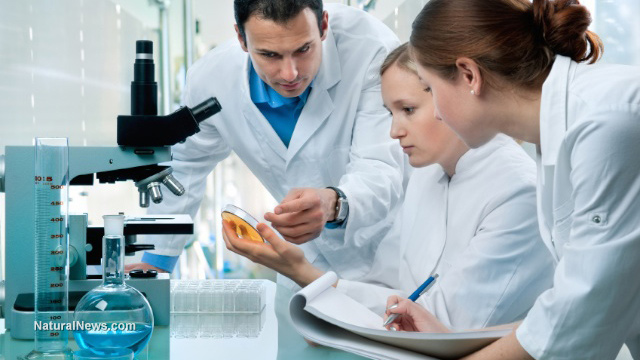NIH prepares to lift ban on experimental research that could create animals with part-human brains, consciousness
Tuesday, August 09, 2016 by: Isabelle Z.
Tags: chimeras, science ethics, human-animal embryos

(NaturalNews) The government has announced that it plans to lift the moratorium on funding experiments that make use of human stem cells to make animal embryos with human qualities, despite previously expressing concerns about these highly controversial procedures.
The moratorium was put in place in September over ethical concerns, but the new policy will allow scientists to make such embryos, known as chimera, with federal funding under certain circumstances.
Scientists are hoping to create animal models of diseases that affect humans using these embryos, which they believe could help them develop new ways to treat these illnesses. Another goal is to create pigs, cows and sheep that have human hearts, livers, kidneys and other organs to use for human transplants.
However, the ethical concerns remain. For example, what if scientists inadvertently (or intentionally) create animals with part-human brains, giving them human consciousness and thinking abilities? What if these animals end up with human eggs and sperm and breed, creating human embryos inside of animals or other hybrid creatures?
Safeguards not enough
The new policy does take steps to ensure that certain human cells are not allowed to be introduced into other primates like monkeys and chimps, because they are so closely related to human beings.A committee will be put in place to consider certain experiments involving human brain tissue or cells – for example, in the case of exploring Parkinson's or Alzheimer's. These experiments will be subject to scrutiny if there is any possibility that the animal's brain could undergo a "substantial functional modification." In the event that animals that have human eggs and sperm are created – for example, to study infertility or human development – certain procedures would have to be followed that would prevent these animals from breeding.
In a blog post, NIH associate director for science policy, Carrie Wolinetz, expressed confidence that the proposed changes would "enable the NIH research community to move this promising area of science forward in a responsible manner."
The committee is a good idea in theory, but given the track record of some of the other governmental agencies out there, it's hardly a comforting thought to those who are legitimately concerned about the possible repercussions of these kinds of Frankenstein-like experiments. The possibility for political interference in this scenario is also quite high. There are lives to be saved, yes, but there is also a lot of money to be made, and that's why this could end up taking a very dark turn.
The NIH is currently accepting comments on the chimera research proposal on its website. The NIH says it will consider all of the public comments it receives before proceeding.
Chimera experiments already underway
Earlier this year, MIT Technology Review reported that human-animal chimeras were already gestating at research farms. They estimated that around 20 pregnancies involving sheep-human or pig-human chimeras had taken place during the previous 12 months, although none of them had been brought to term.Emory University Center of Ethics director, Paul Root Wolpe, told CNN that the procedure was "crude." He said: "We are throwing stem cells into embryonic cells and hoping that it works out. We have to be really careful about that."
NIH ethicist, David Resnik, commented: "We are not near the island of Dr. Moreau, but science moves fast." That's not exactly a comforting thought.
Sources include:
NPR.org
Edition.CNN.com
TechnologyReview.com
OSP.OD.NIH.gov
Science.NaturalNews.com
Chimeras at FETCH.news
Get independent news alerts on natural cures, food lab tests, cannabis medicine, science, robotics, drones, privacy and more.
Take Action: Support Natural News by linking to this article from your website
Permalink to this article:
Embed article link: (copy HTML code below):
Reprinting this article:
Non-commercial use OK, cite NaturalNews.com with clickable link.
Follow Natural News on Facebook, Twitter, Google Plus, and Pinterest
- Newly released JFK files reveal Pentagon's role in creating Lyme disease and covid in the same lab
- Discovery of vast underground city beneath Giza pyramids challenges human history
- Black cumin seed oil emerges as a powerful ally against breast cancer and chronic inflammation
- Sugar-free deception: Artificial sweeteners hijack hunger signals, fuel obesity epidemic, study warns
- Kiss Your Genetic Privacy Good-Bye! 23andMe Gets Green Light to Sell Your Intimate Genetic Details to Anyone They Want
- Aluminum pollution: A silent threat to human health
- Dr. Suzanne Humphries makes bombshell appearance on Joe Rogan podcast, exposing vaccine industry deception back to POLIOMYELITIS
- Sweden's migrant crisis deepens as failed green energy venture leaves thousands jobless, exposes systemic collapse
- Is the vaccine-autism debate reopening? Washington Post sparks controversy with preemptive hit piece on David Geier
- Analysis: The coming economic collapse, a mass uprising and Trump's three secret weapons to halt the growing revolt
- A handful of pecans a day could keep heart disease at bay, study finds
- The mighty Eggplant: An underrated superfood with ancient roots
- Challenging the status quo: “America Fooled” by Timothy Scott exposes the myths about antidepressants
- RFK Jr. slashes HHS bureaucracy, saves taxpayers $1.8B while refocusing on chronic disease epidemic
- The great crypto power struggle: How technocrats and governments are reshaping global finance
- AI breakthrough slashes celiac disease diagnosis time from months to minutes
- Understanding the difference: “Food Allergies and Food Intolerance” by Dr. Jonathan Brostoff and Linda Gamlin
- HIGH-FAT FOOD DEPRESSION: Scientists discover why obesity takes away the pleasure of eating
- Newly released JFK files reveal Pentagon's role in creating Lyme disease and covid in the same lab
- Analysis: The coming economic collapse, a mass uprising and Trump's three secret weapons to halt the growing revolt
- Trump nominates VACCINE ZEALOT Susan Monarez to lead the CDC, sidelining RFK Jr.'s reform efforts
- Trump's greatest betrayal so far: Accelerating Middle East wars, silencing dissent, and serving Zionist masters
- Dr. Mike Yeadon releases 15-minute testimony - WATCH - about genocidal intent of COVID “vaccines”
- Festive flavors: The sweet history, nutritional profile and health benefits of pecan pie
- Elon Musk: Aliens could be here on Earth RIGHT NOW
- Big Pharma's $8 Billion bribery scheme exposed: how doctors are pushed to prescribe junk science, not heal
- 5 Simple steps to boost your brainpower: How to strengthen executive function in a distracted world
- Trump reverses course on Gaza plan, says “nobody is expelling Palestinians”
- A lack of integrity in Academia: Harvard professor found GUILTY of fraudulent research to promote CRT theory
- Reclaim your health: How midlife exercise reverses years of inactivity
- Survival 101: Effective EMF blocking techniques
- Florida takes a stand: DeSantis proposes permanent ban on mRNA vaccine mandates
- Sugarcane extract superior to cholesterol-lowering drugs?
- California's social media censorship law struck down: A victory for free speech or a threat to online safety?
- OpenAI whistleblower who dissented against how the company trained ChatGPT found dead
- EPA advisor admits the agency is funneling billions to climate groups ahead of Trump’s return to White House
- EPA advisor admits the agency is funneling billions to climate groups ahead of Trump’s return to White House
- Newly released JFK files reveal Pentagon's role in creating Lyme disease and covid in the same lab
- California's social media censorship law struck down: A victory for free speech or a threat to online safety?
- Dr. Mike Yeadon releases 15-minute testimony - WATCH - about genocidal intent of COVID “vaccines”
- The Health Ranger releases “Vaccine Zombie” song and music video, using AI-animated zombies for the music video
- The pandemic as a tool for INDOCTRINATION: Understanding “The Indoctrinated Brain” by Dr. Michael Nehls
- Florida takes a stand: DeSantis proposes permanent ban on mRNA vaccine mandates
- “Why we influenced the 2020 elections”: Facebook files reveal the coordinated effort to bury the Hunter Biden laptop story
- Mike Adams releases country western hit single: Goin’ Back in Time is Comin’ Home
- Mike Adams releases music poetry sensation: A Child of God
- Unpacking the Lies That We’ve Been Fed – new song and music video released by Mike Adams, the Health Ranger
- Michigan sheriff announces criminal investigation into 2020 election crimes, Dominion Voting Systems
- Migrants are taking advantage of recent hurricanes to scam residents and loot their homes
- House Intelligence Committee calls for the ARREST and PROSECUTION of Dr. Anthony Fauci
- RFK Jr. clears key hurdle: Sen. Susan Collins backs controversial HHS nominee, signaling a new era for health policy
- Rep. Nancy Mace introduces bill to ban biological males from female facilities on federal property
- Peter Rost exposes Big Pharma corruption in his book “The Whistleblower: Confessions of a Healthcare Hitman”
- Mike Adams releases new song and music video: Nothing More Disgusting Than a Globalist
- Red Cross issues warning to stop blood plasma donations from vaccinated people
- Scientists confirm: GENIUS brain function can be spontaneously unleashed in humans without any apparent cause
- EPA advisor admits the agency is funneling billions to climate groups ahead of Trump’s return to White House
- HYSSOP: What research reveals about the health benefits of this ancient holy herb
- Two containers with completed ballots fall out of truck in Florida
- Fully vaccinated about to see “tsunami” of illness and death, warns virologist
- Global leaders unite to clamp down on “misinformation” with UN-backed Cascais Declaration
- BREAKING: 2025 NDAA authorizes mandatory military draft of WOMEN across America… as Pentagon pursues global NUCLEAR war with both Russia and China at the same time
- Michael Yon warns of a ZIONIST TAKEOVER in Trump’s second administration
- BOMBSHELL: DNA testing kits are a SCAM to develop ethnic-specific bioweapons
- Ozempic and Wegovy weight loss drugs are injectable LIZARD VENOM PEPTIDES that may unleash a devastating wave of organ failure… side effects align with symptoms of SNAKE BITES
- Israeli soldiers accused of even more torture and abuse in the West Bank
- These 13 countries just signed an agreement to engineer a global FAMINE by destroying food supply
- NASA admits that climate change occurs because of changes in Earth’s solar orbit, and NOT because of SUVs and fossil fuels
- RFK Jr. clears key hurdle: Sen. Susan Collins backs controversial HHS nominee, signaling a new era for health policy
- Sermon 30: How Jesus reveals Caesar’s FAKE CURRENCY and FALSE AUTHORITY
- Coriander seeds: Ancient medicine backed by modern science
- Arizona officials claim Maricopa County needs 10-13 days to tabulate results of the election
Science News & Studies
Medicine News and Information
Food News & Studies
Health News & Studies
Herbs News & Information
Pollution News & Studies
Cancer News & Studies
Climate News & Studies
Survival News & Information
Gear News & Information
News covering technology, stocks, hackers, and more



"Big Tech and mainstream media are constantly trying to silence the independent voices that dare to bring you the truth about toxic food ingredients, dangerous medications and the failed, fraudulent science of the profit-driven medical establishment.
Email is one of the best ways to make sure you stay informed, without the censorship of the tech giants (Google, Apple, Facebook, Twitter, YouTube, etc.). Stay informed and you'll even likely learn information that may help save your own life."
–The Health Ranger, Mike Adams












































